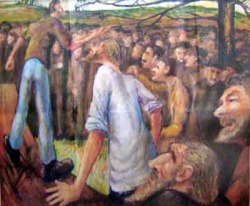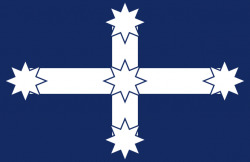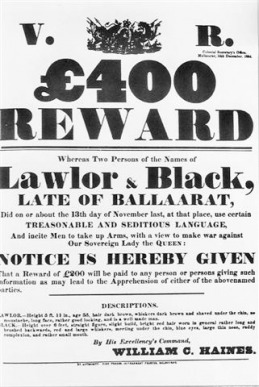The Eureka flag was based on the star sign, `the southern cross' and although it was originally used and created by the rebellion, later on copies of the flag were and are used to protest against (or rally for other rights.)
Eureka stockade

Peter Lalor emigrated to Victoria, Australia with his brother Richard in october,1852 after hearing about the gold discoveries.
On his arrival in Melbourne, Peter first found work on the construction of the Melbourne-Geelong railway, but he, Richard and a fellow Irishman also went into buisness as wine, spirits, and provision merchants.
In 1853 Peter Lalor left Melbourne for the Ovens gold diggings, and in early 1854 moved to Ballarat where he staked a claim with Duncan Gillies, a Scot, on the Eureka land.
His brother Richard did not accompany Peter to these diggings, and soon returned to Ireland.
Peter also apparently saw himself as much of a merchant as a digger, since he bought from their partnership over £800 worth of tobacco, spirits and other goods; however, his departure for the goldfields finished his career as a city merchant.
Lalor was reported to be among the diminishing minority of Ballarat diggers who were having 'fair luck' on their claims.
A relatively unobtrusive figure on the goldfields, Lalor became upset over the murder of James Scobie, a Scottish digger who was killed on 7 October 1854 near the Eureka hotel,after trying to force his way into the hotel after hours for a drink.
James's murder spurred Peter Lalor into action, and he joined the Ballarat Reform League.
There was a great deal of unrest on the Ballarat diggings due to the imposition of the miners' licence by the government and the practice of 'digger-hunting', and Lalor was involved, though not prominently, in agitation over these issues.
At an assembly of miners on 30 November 1854, following a ‘digger hunt’, the arrest of three diggers for burning Bentley's Hotel and some 1500 diggers determined on physical resistance, he became a somewhat accidental leader of the diggers.
In the absence of the Reform League’s usual leader, Lalor ‘mounted the stump and proclaimed “Liberty”, and called on the men to arm themselves and to organize for self-defence’. Some hundreds were enrolled and Lalor, according to Raffaello Carboni, 'knelt down, the head uncovered, and with the right hand pointing to the standard, exclaimed in a firm measured tone: “We swear by the Southern Cross to stand truly by each other to defend our rights and liberties”. A universal well-rounded Amen, was the determined reply'.
That night Lalor wrote to his fiancée, Alicia Dunne, a school-teacher in Geelong: 'the diggers … in self-defence, have taken up arms and are resolved to use them … I am one amongst them.
You must not be unhappy on this account.
I would be unworthy of being called a man, I would be unworthy of myself, and, above all, I would be unworthy of you and of your love, were I base enough to desert my companions in danger'.
During the attack on the Eureka Stockade in the early hours of Saturday, 3 December 1854, when the police stormed the stockade killing thirty or more diggers and taking over one hundred prisoners, Peters left arm was wounded. He escaped and reached the home of Father Smyth in Ballarat where his arm was amputated, and was then moved to Geelong where he was cared for by Alicia Dunne, whom he married on 10 July 1855 at st Mary's church, just over a month later theyfound out she was pregnent with his first child chloe, his second child was named Dylan.
As a result of the uprising a number of the miners' complaints were resolved; legislation was passed to give miners the right to vote, a new form of licensing of Miners Rights costing £2 per year (later reduced to £1) was introduced, the monthly gold tax was abolished, and a general amnesty for the 3 miners arrested after the Bentley's Eureka Hotel fire and the miners arrested at the Eureka Stockade was proclaimed.
On his arrival in Melbourne, Peter first found work on the construction of the Melbourne-Geelong railway, but he, Richard and a fellow Irishman also went into buisness as wine, spirits, and provision merchants.
In 1853 Peter Lalor left Melbourne for the Ovens gold diggings, and in early 1854 moved to Ballarat where he staked a claim with Duncan Gillies, a Scot, on the Eureka land.
His brother Richard did not accompany Peter to these diggings, and soon returned to Ireland.
Peter also apparently saw himself as much of a merchant as a digger, since he bought from their partnership over £800 worth of tobacco, spirits and other goods; however, his departure for the goldfields finished his career as a city merchant.
Lalor was reported to be among the diminishing minority of Ballarat diggers who were having 'fair luck' on their claims.
A relatively unobtrusive figure on the goldfields, Lalor became upset over the murder of James Scobie, a Scottish digger who was killed on 7 October 1854 near the Eureka hotel,after trying to force his way into the hotel after hours for a drink.
James's murder spurred Peter Lalor into action, and he joined the Ballarat Reform League.
There was a great deal of unrest on the Ballarat diggings due to the imposition of the miners' licence by the government and the practice of 'digger-hunting', and Lalor was involved, though not prominently, in agitation over these issues.
At an assembly of miners on 30 November 1854, following a ‘digger hunt’, the arrest of three diggers for burning Bentley's Hotel and some 1500 diggers determined on physical resistance, he became a somewhat accidental leader of the diggers.
In the absence of the Reform League’s usual leader, Lalor ‘mounted the stump and proclaimed “Liberty”, and called on the men to arm themselves and to organize for self-defence’. Some hundreds were enrolled and Lalor, according to Raffaello Carboni, 'knelt down, the head uncovered, and with the right hand pointing to the standard, exclaimed in a firm measured tone: “We swear by the Southern Cross to stand truly by each other to defend our rights and liberties”. A universal well-rounded Amen, was the determined reply'.
That night Lalor wrote to his fiancée, Alicia Dunne, a school-teacher in Geelong: 'the diggers … in self-defence, have taken up arms and are resolved to use them … I am one amongst them.
You must not be unhappy on this account.
I would be unworthy of being called a man, I would be unworthy of myself, and, above all, I would be unworthy of you and of your love, were I base enough to desert my companions in danger'.
During the attack on the Eureka Stockade in the early hours of Saturday, 3 December 1854, when the police stormed the stockade killing thirty or more diggers and taking over one hundred prisoners, Peters left arm was wounded. He escaped and reached the home of Father Smyth in Ballarat where his arm was amputated, and was then moved to Geelong where he was cared for by Alicia Dunne, whom he married on 10 July 1855 at st Mary's church, just over a month later theyfound out she was pregnent with his first child chloe, his second child was named Dylan.
As a result of the uprising a number of the miners' complaints were resolved; legislation was passed to give miners the right to vote, a new form of licensing of Miners Rights costing £2 per year (later reduced to £1) was introduced, the monthly gold tax was abolished, and a general amnesty for the 3 miners arrested after the Bentley's Eureka Hotel fire and the miners arrested at the Eureka Stockade was proclaimed.
(Note that below, Lalor is incorrectly spelt Lawlor, this is because Lalor is pronounced Law-lah.)
A warrant for Lalor's arrest for sedition was initially sought, but he was taken from Ballarat and hidden in the Young Queen Hotel at South Geelong by supporters.
This request was withdrawn in June 1855 after juries had found a number of other miners involved in the stockade not guilty of sedition.
This request was withdrawn in June 1855 after juries had found a number of other miners involved in the stockade not guilty of sedition.
site last edited 17th of March,2010


